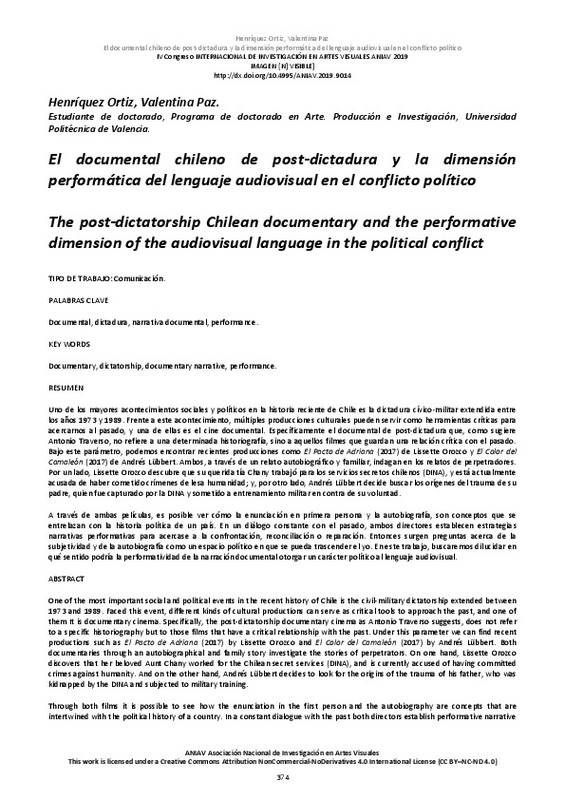JavaScript is disabled for your browser. Some features of this site may not work without it.
Buscar en RiuNet
Listar
Mi cuenta
Estadísticas
Ayuda RiuNet
Admin. UPV
El documental chileno de post-dictadura y la dimensión performática del lenguaje audiovisual en el conflicto político
Mostrar el registro sencillo del ítem
Ficheros en el ítem
| dc.contributor.author | Henríquez Ortiz, Valentina Paz
|
es_ES |
| dc.date.accessioned | 2019-10-18T06:38:07Z | |
| dc.date.available | 2019-10-18T06:38:07Z | |
| dc.date.issued | 2019-09-10 | |
| dc.identifier.isbn | 9788490487662 | |
| dc.identifier.uri | http://hdl.handle.net/10251/128899 | |
| dc.description.abstract | [ES] Uno de los mayores acontecimientos sociales y políticos en la historia reciente de Chile es la dictadura cívico-militar extendida entre los años 1973 y 1989. Frente a este acontecimiento, múltiples producciones culturales pueden servir como herramientas críticas para acercarnos al pasado, y una de ellas es el cine documental. Específicamente el documental de post-dictadura que, como sugiere Antonio Traverso, no refiere a una determinada historiografía, sino a aquellos filmes que guardan una relación crítica con el pasado. Bajo este parámetro, podemos encontrar recientes producciones como El Pacto de Adriana (2017) de Lissette Orozco y El Color del Camaleón (2017) de Andrés Lübbert. Ambos, a través de un relato autobiográfico y familiar, indagan en los relatos de perpetradores. Por un lado, Lissette Orozco descubre que su querida tía Chany trabajó para los servicios secretos chilenos (DINA), y está actualmente acusada de haber cometido crímenes de lesa humanidad; y, por otro lado, Andrés Lübbert decide buscar los orígenes del trauma de su padre, quien fue capturado por la DINA y sometido a entrenamiento militar en contra de su voluntad. A través de ambas películas, es posible ver cómo la enunciación en primera persona y la autobiografía, son conceptos que se entrelazan con la historia política de un país. En un diálogo constante con el pasado, ambos directores establecen estrategias narrativas performativas para acercase a la confrontación, reconciliación o reparación. Entonces surgen preguntas acerca de la subjetividad y de la autobiografía como un espacio político en que se pueda trascender el yo. En este trabajo, buscaremos dilucidar en qué sentido podría la performatividad de la narración documental otorgar un carácter político al lenguaje audiovisual. | es_ES |
| dc.description.abstract | [EN] One of the most important social and political events in the recent history of Chile is the civil-military dictatorship extended between 1973 and 1989. Faced this event, different kinds of cultural productions can serve as critical tools to approach the past, and one of them It is documentary cinema. Specifically, the post-dictatorship documentary cinema as Antonio Traverso suggests, does not refer to a specific historiography but to those films that have a critical relationship with the past. Under this parameter we can find recent productions such as El Pacto de Adriana (2017) by Lissette Orozco and El Color del Camaleón (2017) by Andrés Lübbert. Both documentaries through an autobiographical and family story investigate the stories of perpetrators. On one hand, Lissette Orozco discovers that her beloved Aunt Chany worked for the Chilean secret services (DINA), and is currently accused of having committed crimes against humanity. And on the other hand, Andrés Lübbert decides to look for the origins of the trauma of his father, who was kidnapped by the DINA and subjected to military training. Through both films it is possible to see how the enunciation in the first person and the autobiography are concepts that are intertwined with the political history of a country. In a constant dialogue with the past both directors establish performative narrative strategies to approach confrontation, reconciliation or reparation. Then questions arise about subjectivity and autobiography as a political space in which the self can be transcended. In this work, we will seek to elucidate in what sense the performativity of the documentary narrative could grant a political character to the audiovisual language. | es_ES |
| dc.format.extent | 5 | es_ES |
| dc.language | Español | es_ES |
| dc.publisher | Editorial Universitat Politècnica de València | es_ES |
| dc.relation.ispartof | IV Congreso Internacional de investigación en artes visuales: ANIAV 2019 Imagen [N] visible | es_ES |
| dc.rights | Reconocimiento - No comercial - Sin obra derivada (by-nc-nd) | es_ES |
| dc.subject | Arte | es_ES |
| dc.subject | Producción artística | es_ES |
| dc.subject | Estética | es_ES |
| dc.subject | Teoría del arte | es_ES |
| dc.subject | Gestión cultural | es_ES |
| dc.subject | Educación artística | es_ES |
| dc.subject | Investigación artística | es_ES |
| dc.subject | Documental | es_ES |
| dc.subject | Dictadura | es_ES |
| dc.subject | Narrativa documental | es_ES |
| dc.subject | Performance | es_ES |
| dc.title | El documental chileno de post-dictadura y la dimensión performática del lenguaje audiovisual en el conflicto político | es_ES |
| dc.title.alternative | The post-dictatorship Chilean documentary and the performative dimension of the audiovisual language in the political conflict | es_ES |
| dc.type | Capítulo de libro | es_ES |
| dc.type | Comunicación en congreso | es_ES |
| dc.identifier.doi | 10.4995/ANIAV.2019.2019.9014 | |
| dc.rights.accessRights | Abierto | es_ES |
| dc.description.bibliographicCitation | Henríquez Ortiz, VP. (2019). El documental chileno de post-dictadura y la dimensión performática del lenguaje audiovisual en el conflicto político. En IV Congreso Internacional de investigación en artes visuales: ANIAV 2019 Imagen [N] visible. Editorial Universitat Politècnica de València. 374-378. https://doi.org/10.4995/ANIAV.2019.2019.9014 | es_ES |
| dc.description.accrualMethod | OCS | es_ES |
| dc.relation.conferencename | IV Congreso Internacional de Investigación en Artes Visuales. ANIAV 2019. Imagen [N] Visible | es_ES |
| dc.relation.conferencedate | Julio 03-05, 2019 | es_ES |
| dc.relation.conferenceplace | Valencia, Spain | es_ES |
| dc.relation.publisherversion | http://ocs.editorial.upv.es/index.php/ANIAV/ANIAV2019/paper/view/9014 | es_ES |
| dc.description.upvformatpinicio | 374 | es_ES |
| dc.description.upvformatpfin | 378 | es_ES |
| dc.type.version | info:eu-repo/semantics/publishedVersion | es_ES |
| dc.relation.pasarela | OCS\9014 | es_ES |








